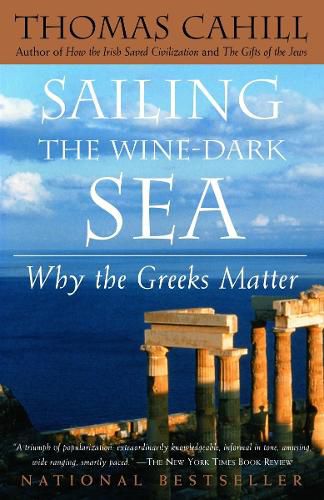Readings Newsletter
Become a Readings Member to make your shopping experience even easier.
Sign in or sign up for free!
You’re not far away from qualifying for FREE standard shipping within Australia
You’ve qualified for FREE standard shipping within Australia
The cart is loading…






In Sailing the Wine-Dark Sea, his fourth volume to explore the hinges of history, Thomas Cahill escorts the reader on another entertaining-and historically unassailable-journey through the landmarks of art and bloodshed that defined Greek culture nearly three millennia ago.
In the city-states of Athens and Sparta and throughout the Greek islands, honors could be won in making love and war, and lives were rife with contradictions. By developing the alphabet, the Greeks empowered the reader, demystified experience, and opened the way for civil discussion and experimentation-yet they kept slaves. The glorious verses of the Iliad recount a conflict in which rage and outrage spur men to action and suggest that their bellicose society of gleaming metals and rattling weapons is not so very distant from more recent campaigns of shock and awe. And, centuries before Zorba, Greece was a land where music, dance, and freely flowing wine were essential to the high life. Granting equal time to the sacred and the profane, Cahill rivets our attention to the legacies of an ancient and enduring worldview.
$9.00 standard shipping within Australia
FREE standard shipping within Australia for orders over $100.00
Express & International shipping calculated at checkout
In Sailing the Wine-Dark Sea, his fourth volume to explore the hinges of history, Thomas Cahill escorts the reader on another entertaining-and historically unassailable-journey through the landmarks of art and bloodshed that defined Greek culture nearly three millennia ago.
In the city-states of Athens and Sparta and throughout the Greek islands, honors could be won in making love and war, and lives were rife with contradictions. By developing the alphabet, the Greeks empowered the reader, demystified experience, and opened the way for civil discussion and experimentation-yet they kept slaves. The glorious verses of the Iliad recount a conflict in which rage and outrage spur men to action and suggest that their bellicose society of gleaming metals and rattling weapons is not so very distant from more recent campaigns of shock and awe. And, centuries before Zorba, Greece was a land where music, dance, and freely flowing wine were essential to the high life. Granting equal time to the sacred and the profane, Cahill rivets our attention to the legacies of an ancient and enduring worldview.